
Where Did You Enter the Job Market?
The rad job market is cyclical-and where you got in can make all the difference.
I just got back from a vacation. It’s the first proper getaway I’ve had in entirely too long; circumstances just haven’t been permitting.
Sitting and enjoying the atmosphere in a mock-speakeasy one evening, I made the acquaintance of a couple of radiology residents. It’s a fun little game I play sometimes: I’ll overhear conversation that only other healthcare-folks would have, and see how long it takes before I’m confident that I’ve figured out their area of medical expertise. Of course, that game goes right out the window if I’m with someone who blows my cover. (“Hey, Eric’s a doctor too! What’s your specialty?”)
It’s also of interest to me to see how rads’ attitudes about our field differ. Much seems to depend on when they got into the game.
Related article:
This couple, for instance, was finishing medschool when the job market was pretty bleak, and competition for rad-residency spots was thus relatively low. They were able to not only get spots in a desirable institution, but to do so with the “couples match.”
By contrast, I thought I was applying at an easy time. When I was finishing up medschool, word on the street was that the job market was lousy, and one should consider other specialties if one wanted a bright professional future. Not much of a deterrent for me, for various reasons.
So I looked forward to breezing through easy interviews and getting myself a spot in a top-flight institution with no real effort-until, at precisely the wrong time, the job market came roaring back to life, and applicant-to-position ratios launched into the stratosphere. I could therefore look forward to a roaring start for my post-residency career in rads-if I got into the specialty at all. (I consider it a minor miracle that I did.)
Pretty much anybody in our field will tell you-often as if they are letting you in on a brilliant secret that they alone have figured out-that the rad-job market is cyclical. If you are in a bad spot, hang in there, and things will turn around. If you are sitting pretty, don’t get too comfortable. Rarely, someone will act contrarian and float the notion that this time is different: A current downturn might never recover, for instance.
Round and round it goes
The impact of where one enters the cycle, I think, isn’t recognized as much as it might be. Starting as early as applying for residency: If the field is in a boom-phase, an applicant is going to face strong competition and wind up in less-desirable locations (if they get in at all).
Subsequent years of training will be in the company of other folks who made the cut, without much room for slacking off lest one wish to stand out like a sore thumb. The same crowd will be just as competitive when applying for desirable fellowships.
Or maybe one applies and gets in when the field is experiencing leaner times. Less competition tends to mean less effort required, and also less stress. The residency might not even fill all of its spots. One might more readily stand out like a brilliant superstar.
Meanwhile, once in training, a resident is hearing about what the job market is up to from the attending rads in the department. One learns attitudes, positive and negative, at least as readily as one learns to read imaging-studies.
I recall rather resenting one of our attendings, for instance, a couple of years after the jobs-boom had made my residency-application a bundle of competitive stress. She seemed to derive unholy pleasure from telling us rezzies that the good times were petering out, and the job market was about to dry up just in time for us to graduate. Happily, it took a few more years before that actually happened.
The job market
One’s position in the cycle upon entering the post-training job market has an impact, also. If things are booming when you’re fresh out of residency/fellowship, you stand a much better chance of getting a gig you like, where you like it. You might attain partner-status and spend the rest of your career there, never seriously considering a change of venue.
On the other hand, the place that took you aboard under favorable terms when times were good might turn out to be less rad-friendly when the cycle turns, leaving you seeking other opportunities precisely when there are few to be found.
Meanwhile, for the rad who finishes training during a downturn of the cycle, it’s not all bad news. To start with, such times make it more appealing to do a fellowship (or a second one), whereas a red-hot job market might have enticed one to grab a good gig right away. The months of that fellowship might just delay that rad’s entry to the job-market until the next upswing occurs. (Not to mention boosting credentials for the rest of his or her career.)
Related article:
Even if the rad goes ahead and takes a lackluster job during such lean times, it can be advantageous in the long term. Those initial months or years after training contain some of the steepest learning-curves a rad will ever experience, and an employer might not be so understanding as to let the newbie-rad find his footing at his own pace.
The time it takes such a rad to gain confidence and efficiency might just be the time the cycle needed to advance to its next upswing-at which point the rad will be ready to apply for his next, hopefully long-term gig.
Newsletter
Stay at the forefront of radiology with the Diagnostic Imaging newsletter, delivering the latest news, clinical insights, and imaging advancements for today’s radiologists.












